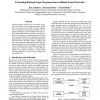Free Online Productivity Tools
i2Speak
i2Symbol
i2OCR
iTex2Img
iWeb2Print
iWeb2Shot
i2Type
iPdf2Split
iPdf2Merge
i2Bopomofo
i2Arabic
i2Style
i2Image
i2PDF
iLatex2Rtf
Sci2ools
APIN
2010
2010
Extracting reduced logic programs from artificial neural networks
Artificial neural networks can be trained to perform excellently in many application areas. While they can learn from raw data to solve sophisticated recognition and analysis problems, the acquired knowledge remains hidden within the network architecture and is not readily accessible for analysis or further use: Trained networks are black boxes. Recent research efforts therefore investigate the possibility to extract symbolic knowledge from trained networks, in order to analyze, validate, and reuse the structural insights gained implicitly during the training process. In this paper, we will study how knowledge in form of propositional logic programs can be obtained in such a way that the programs are as simple as possible -- where simple is being understood in some clearly defined and meaningful way.
Related Content
| Added | 08 Dec 2010 |
| Updated | 08 Dec 2010 |
| Type | Journal |
| Year | 2010 |
| Where | APIN |
| Authors | Jens Lehmann, Sebastian Bader, Pascal Hitzler |
Comments (0)

